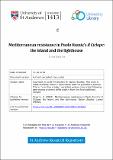Mediterranean resistance in Paolo Rumiz's Il Ciclope : the island and the lighthouse
Abstract
Within the growing scholarly attention, in the field of Italian Studies, devoted to contemporary travel writing, on the one hand, and to writers coming from the geo-historical ‘margins’ of the peninsula, on the other, Paolo Rumiz’s works have sparked critical interest in recent years. In contrast with the prevailing reading of Rumiz’s work as mostly concerned with Eastern Europe, in this essay I assess the centrality of the Mediterranean in the author’s narrative imaginary, as it emerges in Il Ciclope (2015). Drawing on geocritical and ecocritical theories, I show how Rumiz’s Mediterranean island – where the real and imaginary travel of Il Ciclope takes place – narratively reveals itself as a space that comprises land and sea at the same time; a space that, while being localised, can also address global concerns, and that, from its supposedly marginal position in the global world, can become a centre of critical thinking.
Citation
Caserta , S 2019 , ' Mediterranean resistance in Paolo Rumiz's Il Ciclope : the island and the lighthouse ' , Italian Studies , vol. 74 , no. 1 , pp. 87-99 . https://doi.org/10.1080/00751634.2019.1532646
Publication
Italian Studies
Status
Peer reviewed
ISSN
0075-1634Type
Journal article
Collections
Items in the St Andrews Research Repository are protected by copyright, with all rights reserved, unless otherwise indicated.

